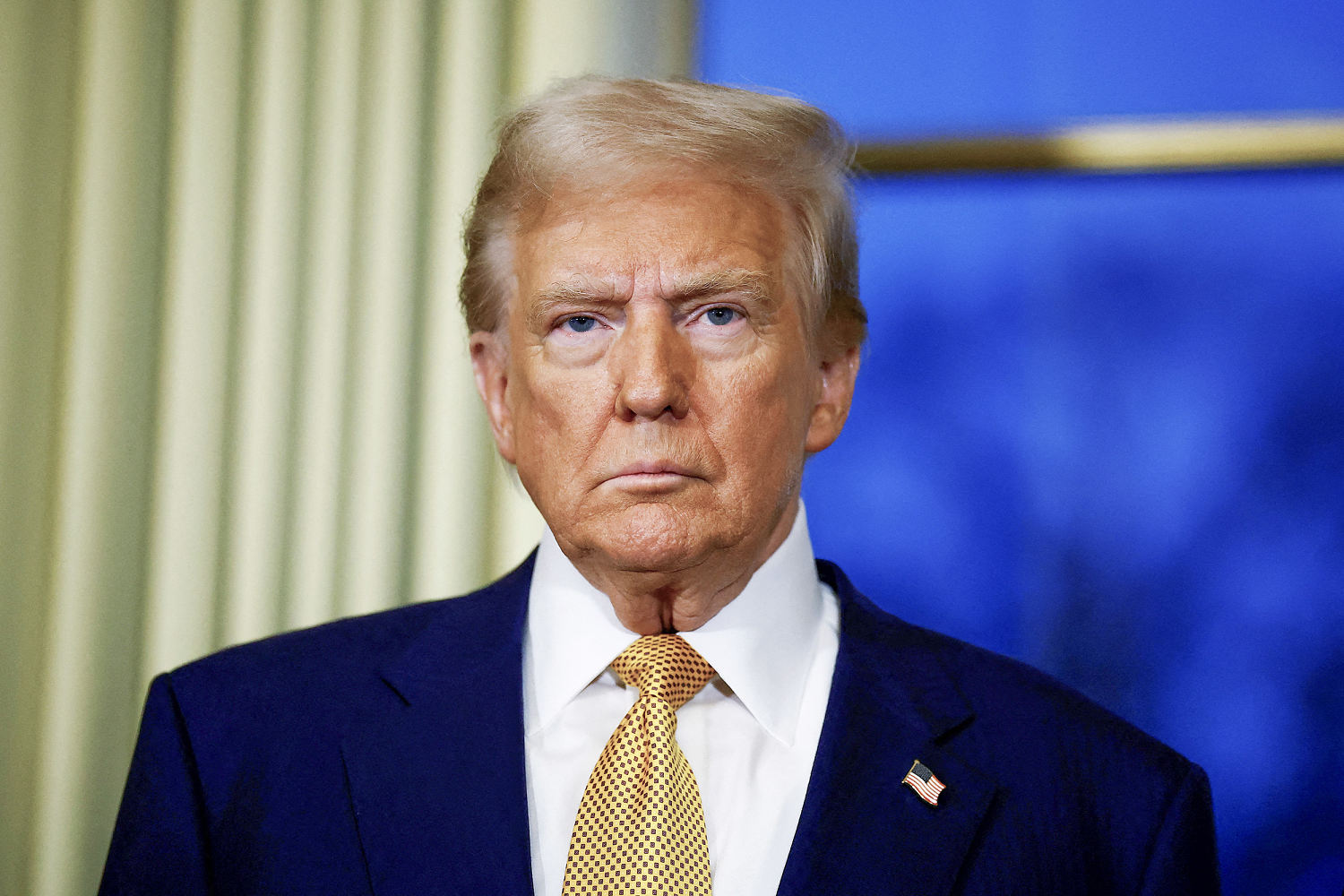We cannot afford to delay modernizing the US power grid

During his first presidency, Donald Trump repeatedly promised to modernize America's outdated infrastructure. As it turned out, it was President Biden who worked with Congress to appropriate $1.2 trillion to repair and update the nation's power lines, pipes, bridges and highways.
Without a single Republican vote, Biden also managed to win the largest-ever investment in clean and renewable energy.
Nothing is more critical to the nation's future than its energy supplies and how we distribute and use them. Now, the ball will be passed again to Trump and a new Republican-controlled Congress.
Although the infrastructure and energy bills are on the books, incoming leaders will try to influence how the money is spent. Rather than allowing the nation's clean-energy transition to proceed, they could redirect the appropriations to far less essential purposes or spend them on last century's energy: fossil fuels. We can't let that happen.
Meanwhile, the infrastructure bill will lay the foundation for clean and renewable energy in the United States by spending $65 billion — the largest such investment in American history — on a modern electric transmission and distribution system.
That system is often called the biggest machine ever built. It consists today of 11,000 generation plants, 5.5 million miles of transmission and distribution lines (enough to stretch to the moon and back 46 times), 180 million power poles, 3,000 electric utilities, 590 oil and gas rigs, 2.5 million miles of gas pipelines, 560 active coal mines and three separate regional electric grids that mainly transmit alternating current.
In 1982, energy visionaries Amory and Hunter Lovins published a study commissioned by the Defense Department to assess the system's security. The Lovins warned that America relied on a "continuous electrical supply (that) depends on many large and precise machines, rotating in exact synchrony across half a continent, and strung together by an easily severed network of aerial arteries whose failure is instantly disruptive."
They warned, "The size, complexity, pattern, and control structure of these electrical machines make them inherently vulnerable to large-scale failures: a vulnerability which government policies are systematically increasing. The same is true of the technologies that deliver oil, gas, and coal to run our vehicles, buildings, and industries. Our reliance on these delicately poised energy systems has unwittingly put at risk our whole way of life."
That assessment is still accurate. Fossil fuels have triggered economic recessions and brought the world to the brink of permanent environmental catastrophe. Power outages cost U.S. businesses $150 billion annually and households a similar amount. Extreme weather is responsible for more than 80 percent of blackouts. Because of global climate change, power interruptions have increased 67 percent in the U.S. since 2000. Millions of Americans have also found themselves without electricity because tree branches touched powerlines, squirrels chewed through system components, or vandals took potshots at transformers.
Now, the big machine faces modern challenges, including power-hungry electric vehicles, data farms, artificial intelligence, cryptocurrency mining, and a resurgence in domestic manufacturing.
During the last decade, energy-efficiency gains have kept America's electric demand relatively stable despite the growing population and economy. Now, a single query using ChatGPT uses nearly 10 times the electricity of a Google search. Analysts say data center power demands could triple in the U.S. over the next three years.
The good news is that nonpolluting, inexhaustible energy has become the least expensive and quickest way to generate electricity. Some 126 million solar panels on 4.3 million rooftops already contribute to the nation's power supply, along with 75,000 wind turbines, nearly 4,200 large solar farms and 2,100 hydroelectric dams. However, we need vastly more. We have the natural resources and technologies to provide it, but we must modernize and expand the grid to move clean energy to where it's needed.
As Amory Lovins says today, "We've got 21st-century technology and speed colliding head-on with 20th and 19th-century institutions, rules, and cultures."
"Our grid is at a make-or-break moment," according to Willie L. Phillips, chair of the Federal Energy Regulatory Commission. "(The grid) is being tested every single day in ways that we've never seen before. We're not talking about regular demand. We're talking about dramatic increases of demand on our system."
One idea gaining traction at the U.S. Department of Energy and Google is to locate power-hungry data operations where renewable resources are available and equip them with microgrids that can detach from the larger grid during outages. Several data operations could be served by the same assets if they are co-located in "energy parks."
Other experts point out that the transmission system could move electricity over long distances more economically by connecting renewable energy assets with load centers using high-voltage, direct current (HVDC) lines. They can be routed along existing rights of way and buried to keep them safe from weather and to minimize NIMBYism. The Energy Futures Initiative says the nation is underinvesting in HVDC today even though it's "the backbone grid that is important for economic growth, reliability, resiliency, and the proliferation of low-cost clean energy."
One challenge is the number of actors and stakeholders in America's electric system. They include three transmission regions, utilities, independent power producers, standards organizations, grid operators, government agencies, and consumer and environmental groups. Fortunately, under Biden's Energy secretary, Jennifer Granholm, the U.S. Department of Energy has issued a comprehensive grid modernization strategy, the coordinated product of nine DOE offices and 14 national laboratories.
For the sake of America's future, we should hope that Trump, Congress and decision-makers nationwide use the strategy to optimize the benefits of every dollar. After all, it was Thomas Edison, the inventor of the light bulb, DC power and America's first power plant, who said, "I'd put my money on the sun and solar energy. I hope we don't have to wait until oil and coal run out before we tackle that." He also said, "Good fortune is what happens when opportunity meets with planning."
William S. Becker is a former regional director at the U.S. Department of Energy and author of several books on climate change and national disaster policies, including the “100-Day Action Plan to Save the Planet” and “The Creeks Will Rise: People Co-Existing with Floods.”
Topics
-
Milei’s next economic mission: affordable air fryers
Libertarian leader scraps tariffs to break open Argentina’s protectionist economy, unnerving domestic industryFinancial Times - 21h -

Solar panels are powering through US West wildfire smoke: Study
The wildfire smoke that often wafts across the U.S. West may only be causing minimal disturbance to the output of photovoltaic solar panels, a new study has found. Smoke-linked losses of ...The Hill - 1d -

Winter Storm Blair: four people reported dead as hundreds of thousands across US without power – latest updates
Seven states declare states of emergency as flights are cancelled, schools closed and drivers face treacherous road conditions. Tell us how you have been affected by Winter Storm Blair US ...The Guardian - 1d -

I was there on Jan. 6 — we cannot allow Trump to rewrite history
Every member of Congress, including Republicans in both chambers, have a duty to loudly and publicly oppose the pardoning of criminals who assaulted and tried to kill their colleagues and police ...The Hill - 1d -

Only US leadership can stop China’s economic power in Latin America
The only way to stop China’s accelerated advance in Latin America continues to be democracy and the counterweight of greater leadership from Europe and the U.S.The Hill - 3d -

What one picture tells us about Trump's power in Congress
Friday's vote underscores the challenges for Trump in keeping House Republicans united to legislate his agenda.BBC News - 4d -

Top Fed official warns of US inflation risk after Trump takes power
Tom Barkin’s comments come just weeks before the president-elect takes office with a vow to raise tariffsFinancial Times - 4d -

US fines JetBlue $2m for ‘chronically delayed flights’ in unprecedented act
Department of Transportation denounces ‘unrealistic’ JetBlue schedules in yet another setback for the airline. The US Department of Transportation (DOT) announced on Friday a $2m fine against ...The Guardian - 4d -

From Carter’s diplomacy to Trump’s unilateralism: A reckoning for US power in the Americas
Donald Trump's second term as president is marked by a shift from multilateralism to unilateralism, with a focus on reasserting control over strategic infrastructure and using punitive measures to ...The Hill - 4d
More from The Hill
-

Fetterman compares Trump’s Greenland talk to Louisiana Purchase
Sen. John Fetterman (D-Pa.) compared President-elect Trump’s talk of acquiring Greenland to the Louisiana Purchase. Fetterman joined Fox News, alongside Sen. Katie Britt (R-Ala.), on Tuesday to ...The Hill - 1h -

Republicans hold on to Virginia state Senate seat
Republican Luther Cifers defeated Democrat Jack Trammell in the special election for the state Senate's 10th District on Tuesday, according to Decision Desk HQ, maintaining Republicans’ grip on the ...The Hill - 1h -

Gaetz 'starting to think about' run for governor
Former Rep. Matt Gaetz (R-Fla.) said in a new interview that he’s “starting to think about” running for governor of Florida in 2026. In an interview with the Tampa Bay Times, the former ...The Hill - 2h -

Democrats hold Virginia state House seat in closely watched special election
Democrat JJ Singh has defeated Republican Ram Venkatachalam in the special election for the Virginia state House's 26th District, according to Decision Desk HQ. The seat was formerly held by Del. ...The Hill - 2h -

Virginia Democrats hold state Senate seat in Loudon County
Virginia Del. Kannan Srinivasan (D) has defeated Republican Tumay Harding in the special election to fill the seat representing the state Senate's 32nd District, according to Decision Desk HQ. The ...The Hill - 2h
More in Politics
-

N.Y. appellate judge allows Trump's Friday hush money sentencing to go forward
A New York appeals court judge Tuesday denied Donald Trump's bid for an emergency order halting the president-elect's scheduled sentencing Friday on criminal charges in the hush money case.NBC News - 41m -

Fetterman compares Trump’s Greenland talk to Louisiana Purchase
Sen. John Fetterman (D-Pa.) compared President-elect Trump’s talk of acquiring Greenland to the Louisiana Purchase. Fetterman joined Fox News, alongside Sen. Katie Britt (R-Ala.), on Tuesday to ...The Hill - 1h -

Republicans hold on to Virginia state Senate seat
Republican Luther Cifers defeated Democrat Jack Trammell in the special election for the state Senate's 10th District on Tuesday, according to Decision Desk HQ, maintaining Republicans’ grip on the ...The Hill - 1h -
Medical debt banned from credit reports by new Biden administration rule
Unpaid medical bills will no longer appear on credit reports under a final rule announced by the Biden administration.CBS News - 1h -

Gaetz 'starting to think about' run for governor
Former Rep. Matt Gaetz (R-Fla.) said in a new interview that he’s “starting to think about” running for governor of Florida in 2026. In an interview with the Tampa Bay Times, the former ...The Hill - 2h